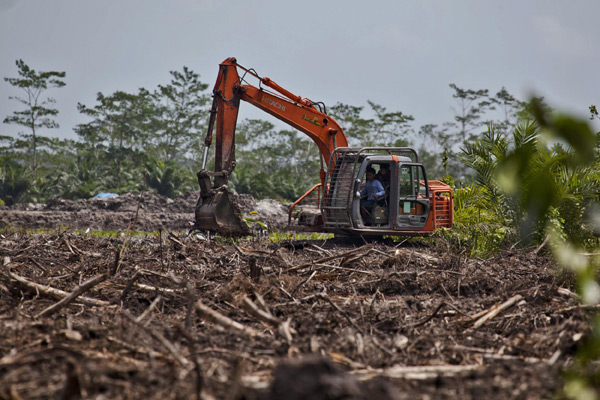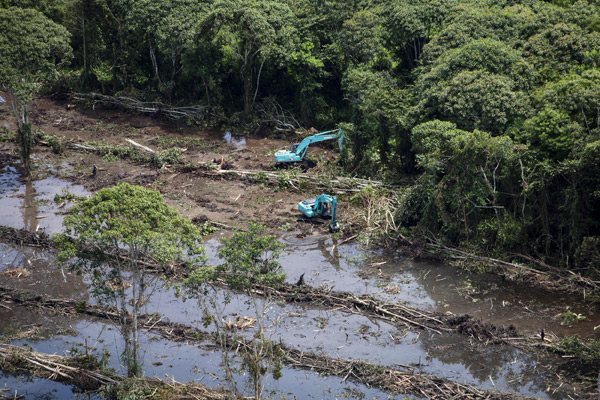
Peatland forest clearance for palm oil. Excavators clear intact peatland forests and build drainage canals in an oil palm concession owned by PT Andalan Sukses Makmur, a subsidiary of Bumitama Agri Ltd. Taken 11/13/2013 © Kemal Jufri / Greenpeace.
A series of photos released this week by Greenpeace shows that an Indonesian palm oil company is continuing to clear orangutan habitat in Borneo despite a pledge to stop destroying the forest.
Flyovers of a concession owned by PT Andalan Sukses Makmur, a subsidiary of Bumitama Agri Ltd, show excavators clearing peat forests and digging drainage canals just outside Tanjung Puting National Park in Central Kalimantan. Tanjung Puting is famous for its population of orangutans that have been intensely studied by Birute Galdikas, a noted researcher and conservationist.
Greenpeace says mapping and field investigations show that forest conversion took place February and October 2013, “including clearance of intact peatland forests inside buffer zones identified on the high conservation value (HCV) assessment for the concession.” The deforestation proceeded despite a pledge from Bumitama not to clear an where a survey identified a group stranded orangutans.

Clearance for oil palm plantations near Tanjung Puting National Park. An excavator constructs a canal in recently cleared land in an oil palm concession owned by PT Andalan Sukses Makmur (PT ASMR) concession, a subsidiary of Bumitama Agro Ltd. The area is near Kumai Seberang village, next to Tanjung Puting National Park in Central Kalimantan. Taken 09/11/2013 © Ulet Ifansasti / Greenpeace
Greenpeace is using the incident to put pressure on Wilmar International, the world’s largest palm oil trader, which is major a buyer of Bumitama’s palm oil.
“Only last week, Greenpeace has again caught a supplier to Wilmar in the act of carving up forests that are critical habitat for orang-utans beside an internationally renowned national park. For more than 6 months, global NGOs have been pushing for this company to stop its destructive practices, but on the ground the clearing continued and the orang-utans inside their concessions suffered,” said Bustar Maitar, head of the Indonesia forest campaign for Greenpeace International.
“Greenpeace wants urgent confirmation from Bumitama that all land clearing has stopped, and that Bumitama is committing to full forest and peatland protection in all its concessions. Until Bumitama commits to a No-Deforestation policy, the orang-utans and forests in their concession remain at risk.”
Another Indonesian palm oil giant, Golden-Agri Resources, signed a no-deforestation pact in 2011 after a long-running and highly damaging campaign by Greenpeace.
Over the past 20 years, palm oil has emerged as one of the biggest drivers of deforestation in Southeast Asia. According to a study released last week, 1.3 million hectares of forest in Kalimantan were converted for oil palm plantations between 1990 and 2010. Overall Kalimantan had nearly 3 million hectares of oil palm estates by 2010, second only to Sumatra which had 4.7 million hectares.

Peatland forest clearance for palm oil. Excavators clear intact peatland forests and build drainage canals in an oil palm concession owned by PT Andalan Sukses Makmur. Taken 11/13/2013 © Kemal Jufri / Greenpeace

Clearance for oil palm plantations near Tanjung Puting National Park. The concession, next to Tanjung Puting National Park in Kumai District, Central Kalimantan, is habitat for numerous endangered species including orangutans and proboscis monkeys as well as ramin. Taken 11/13/2013 © Kemal Jufri / Greenpeace